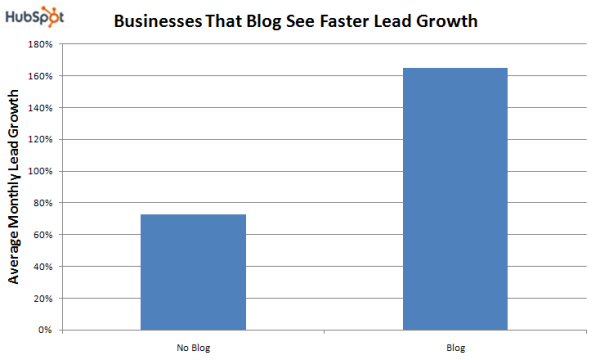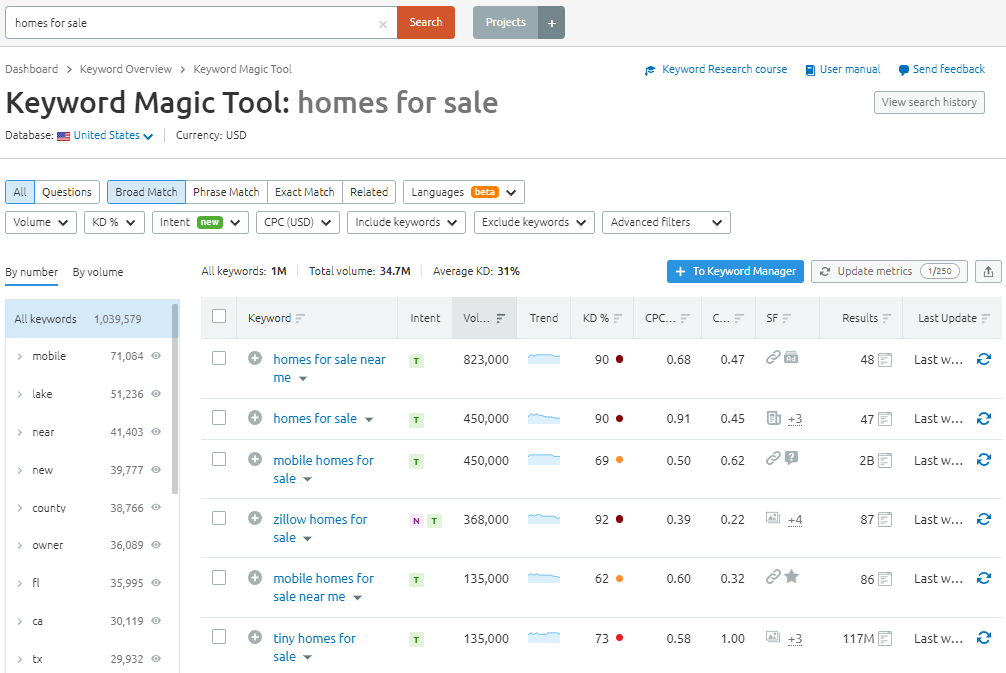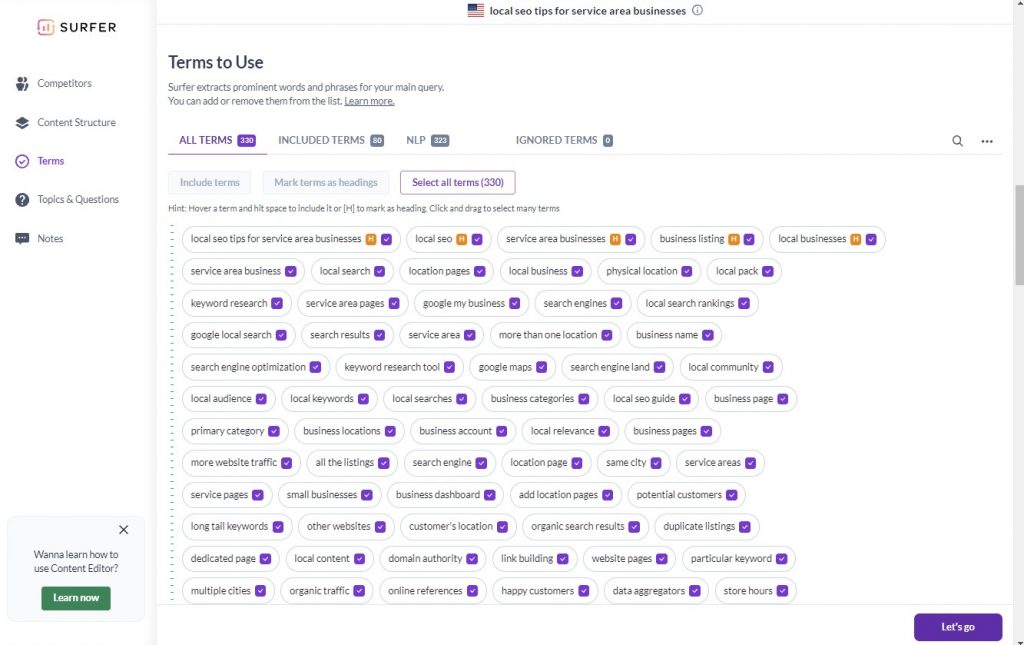Check out these blogging tips for small businesses to find out how to improve your digital marketing efforts and generate more quality website traffic with your blog.
If you're an up-and-coming business owner or already managing a small business, starting a blog for your business can increase rankings, site traffic, and revenue.
By publishing helpful blog posts, you can improve your visibility in search engines for keywords and topics relevant to your business, which can lead to more leads and sales.
Affording to a study by HubSpot, businesses that blog get 126% more monthly leads than those without a blog writing process.

To blog successfully for your business, the trick is to create optimized content backed by topic, keyword, and competitor research to maximize your blog's search traffic.
Publish blog posts that educate your target audience and clearly answer the questions they have on the given topic (based on keyword research). Depending on the topic, share how your products or services can help solve their potential problems.
Your blog is an extension of your brand and a valuable marketing tool for differentiating your business, connecting with your audience, and promoting your offerings.
Proven Blogging Tips to Grow Your Small Business
To improve the search engine optimization (SEO) and visitor engagement of your business's website, consider the following blogging tips for small businesses:
1. Publish Blog Posts Regularly & Consistently
Posting regularly & consistently signals to search engines that your website is active and includes higher levels of relevant content and links, which can boost your rankings.
Here are some ways blogging on a regular basis can help your business:
- Grow a returning audience, drive traffic, and earn more customers.
- More quality posts help increase your site's authority on relevant subjects.
- More blogs provide more opportunities to add internal links and earn backlinks.
- Blog posts provide more content that you can repurpose for social media.
- A larger blog provides additional data on what resonates with potential customers.
- Publishing blogs can help convert more traffic into leads and sales.
You don't necessarily have to post multiple times a day or daily, but it's a good idea to follow a consistent posting schedule to keep your small business blog active.
Related: Helpful Guide to Start Blogging at Home
Every Blog Post Should Have a Purpose
At the same time, avoid churning out irrelevant or rushed content. Every single one of your posts should have a purpose, whether it be educating your target audience on a particular topic, sharing news, or promoting a product or service.
Although it's recommended to post a new article at least a couple of times a week, you can also post once a week to keep your blog updated, provide fresh content to search engines for potential ranking improvements, and keep your audience in the loop.
2. Target Keywords Searched by Potential Customers
Performing keyword research and naturally incorporating relevant keywords and subtopics in your business blogs can help you expand the search visibility of your blog content, rank higher in search results, and generate more search traffic.
Better Understand Your Potential Customers
Keyword research helps identify what your potential customers are searching for, which is valuable data you can use for current and future posts.
Semrush's Keyword Magic Tool is an industry-leading keyword research tool to find the best in-demand topics and keywords for your business's blog posts and pages.
Once you have a target keyword and topic in mind, search up the keyword in Google and note the top 1-5 ranking page URLs.
Then, inspect each URL in Semrush using the Organic Research Tool to see all the related keywords each page is ranking for and the estimated traffic they generate.
These are often the perfect keywords to incorporate into your blog post content.

In addition, once you've chosen a target keyword and topic for your blog post, you can use Surfer SEO to uncover all related words to use based on top-ranking pages.

Also, some free options for basic keyword research are Google Keyword Planner to find keyword ideas and Google Search Console for keyword data post-publishing.
When adding keywords to your article, make sure they're placed naturally throughout your content and avoid keyword stuffing in an attempt to manipulate search results.
Use Familiar Words & Phrases
Use words and phrases that your potential customers would understand and use in their searches. For example, if you have a fitness blog, insert keywords such as “fitness tips” or “fitness enthusiasts” where it makes sense.
You can also go a bit further and add supporting keywords that target specific people, interests, and demographics related to your blog topics and business niche.
Understand Keyword Density
Maintain a consistent but healthy keyword density through your blog post to help search engines understand the primary topic and subtopics of the post.
Aim for 1%-3% of your post containing the main keyword phrase related to your blog topic. For example, if your blog post contains 1,000 words, your target keyword is used around 10-30 times. Just be mindful of how your content flows before publishing.
For more keyword research insights, check out these 50 keyword research tips.
3. Refrain From Writing Ultra-Short Articles
While it's tempting to write articles with only 200 to 500 words, they typically don't rank high very often. This is primarily because there's not much you can say in less than 500 words to be comprehensive, especially if it's meant to be informational or transactional.
Optimizing Blog Posts Leads to More Information
Also, more small businesses are investing in SEO strategies that include optimizing and extending the length of blog posts and pages to be as helpful and detailed as possible for searchers. As a result, longer blog posts rank best in search engines.
Longer Posts Can Improve Blog Engagement Metrics
People are more likely to share your posts if it contains all the relevant information related to the given topic. Also, creating content that's longer will naturally increase the time people spend on your blog, leading them to check out more of your posts.
With that said, avoid fluffing up your blog posts or adding irrelevant content to increase your word count. Your content should be as long as it needs to be helpful.
Keep Your Audience In Mind When Blogging
Generally, writing blog articles with 1,000 to 2,000 words ranks better than posts with less than 500 words. However, you'll also have to keep your audience in mind.
If you're writing about a topic that doesn't require many words, stick with shorter posts. After all, there’s only so much you can say when writing about a recipe or a product.
4. Write Engaging, Relevant, and Interesting Content
People won't read your blog articles if they aren't interesting or relevant to what they're searching for online. Blogging is a way to engage with your customers and prospects, educate them, differentiate your brand, and promote helpful offers.
Gain Insight from Competitor Blog Posts
You can use competitor blog posts as a template and gain inspiration on topics and keywords relevant to your target audience, but make sure to use your own words and writing style to create engaging content that's helpful to your target audience.
Interact With Your Readers
Additionally, interact with your blog readers whenever possible and answer their questions honestly and promptly.
You might gain valuable or critical feedback to improve your blog, products or services, and business in general.
5. Promote Your Blog Through Other Channels
Sometimes, publishing quality content on your business blog isn't enough to boost your rankings in search engines or might take longer than expected to move the needle.
Promote Your Business Blog on Social Media
Promoting your blogs on social media sites can help generate quick traffic and links, which can signal to Google that your content is worth ranking higher and sooner.
Share Links to Your Blog Posts on Other Sites
You can also share links to your blog posts on your YouTube channel if you have one or on relevant forums and community sites like Reddit and Quora.
6. Connect With Other Bloggers
In most cases, small businesses are keen to help other businesses as long as there's a fair exchange of value. It's a win-win situation; they help you and you help them.
Collaborating with other bloggers by guest blogging can give your business, site, and blog more exposure, expand your audience, and earn inbound links.
Cross Promotion Opportunities
Depending on the partnership, you may be able to promote each other's products or services within guest blog content and other areas of your sites. The combined effort between you and other bloggers will surely increase your impact online.
Interact With Bloggers & Share Content
Alongside guest blogs, it's also worth forming business relationships with other bloggers by sharing comments on their posts and sharing their content on social media sites.
Since the most influential bloggers with large audiences might not respond to starting bloggers, it's best to target small businesses or micro-influencers relevant to your industry and build up from there.
7. Build a Community
When blogging, strive to build a connection with your readers and customers. Treat your readers and customers like friends and family rather than a transaction.
Create a Community Group
You can build a close-knit community where your audience, existing customers, and potential customers can chat and interact.
You can do this by creating a Facebook Group, Instagram Group, or Twitter List dedicated to your blog, related topics, or an aspect of your industry.
Build an Email List
You can also launch an email or subscription list to share regular blog updates, related tips, industry news, and promotions as part of your content marketing strategies.
Loyal members might also help promote your business by bringing in new members and referrals with the help of their own network, social shares, and comments.
Conclusion
Blogging is a great way to promote your products and services, expand your brand's visibility online, improve local SEO, and acquire prominent local search rankings.
Alongside sharing your knowledge with the world, blogging gives small business owners the opportunity to network, build relationships, and maximize revenue.
When blogging, publish high-quality content that's helpful and relevant to your customers and prospects. Blog regularly to generate more referrals and organic traffic.
Recommended Tools for Business Blogging
Check out blogging tools like Surfer SEO (optimize content to rank) and Jasper AI (generate content fast) to save time, boost rankings, and automate your SEO efforts.